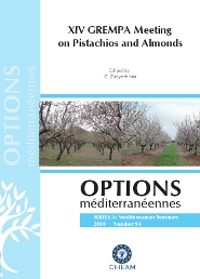| Article précédent | p. 123-128 | Article suivant |
The importance of pollination type (self or cross) in two self-compatible almond cultivars: Francolí and Guara
Type of pollination (self or cross-pollination), and their influence on nuts, in two self-compatible almond cultivars Francolí and Guara, growing in commercial orchards, was observed in 2006. One orchard with Glorieta and Masbovera cvs as pollinators of Francolí, and the second orchard with Ferraduel, Guara and Masbovera cvs. Four hundred fruits from Francolí and 160 from Guara were collected, characterized and put to germinate. Molecular markers (isozymes and SSRs) were applied to the seedlings to know the pollen source of each almond. Francolí nuts showed that self-pollination was higher (77 percent) than cross-pollination (23 percent). Type of pollination in Guara seeds seemed to be similar (61 percent self and 39 percent cross-pollination), although not all seedlings have been analyzed yet. So far, the results for both cultivars showed that the type of pollination has not affected the nut characters studied. Further observing years are planned.
Le type de pollinisation (auto ou croisée) et son influence sur les fruits, chez deux variétés d'amandier auto-compatibles, Francolí et Guara, plantés en vergers commerciaux, a été étudié pendant l'année 2006. Glorieta et Masbovera se trouvaient comme pollinisateurs de Francolí, dans un verger et Ferraduel, Guara et Masbovera, étaient les trois variétés d'un deuxième verger. Quatre cents fruits de Francolí et 160 de Guara ont été récoltés, caractérisés et mis à germer. Des marqueurs moléculaires (isozymes et SSR) ont été utilisés sur les semis germés pour connaître l'origine du pollen de chaque semis. Pour Francolí, les amandes provenant de l'autopollinisation étaient supérieures (77 pour cent) à celles provenant de la pollinisation croisée (23 pour cent). Pour Guara, malgré le fait que les fruits n'étaient pas tous analysés, la proportion était plus égalitaire : 61 pour cent provenaient d'autopollinisation et 39 pour cent de pollinisation croisée. Les premiers résultats montrent que le type de pollinisation (auto ou croisée), n'a pas d'influence sur les caractéristiques des fruits étudiés. Il est prévu de continuer ce travail dans les prochaines années.
- [ Afficher ]
- [ Télécharger ]
- [ Exporter la citation ]
Vous pouvez télécharger la citation au format :
- [ Imprimer ]
-
Mots-clés
AMANDE, AUTOCOMPATIBILITE, AUTOPOLLINISATION, ISOENZYME, MARQUEUR GENETIQUE, POLLINISATION CROISEE, PRUNUS DULCIS, VARIETECiter cet article
Martín I., Rovira M. The importance of pollination type (self or cross) in two self-compatible almond cultivars: Francolí and Guara. In : Zakynthinos G. (ed.). XIV GREMPA Meeting on Pistachios and Almonds. Zaragoza : CIHEAM / FAO / AUA / TEI Kalamatas / NAGREF, 2010. p. 123-128. (Options Méditerranéennes : Série A. Séminaires Méditerranéens; n. 94). 14. GREMPA Meeting on Pistachios and Almonds, 2008/03/30-2008/04/04, Athens (Greece). http://om.ciheam.org/om/pdf/a94/00801294.pdf



